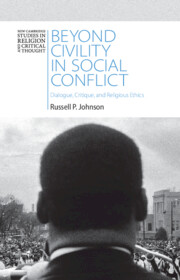
- Publisher:
- Cambridge University Press
- Online publication date:
- November 2024
- Print publication year:
- 2024
- Online ISBN:
- 9781009427227
- Subjects:
- Social Theory, Religious Ethics, Religion, Religion: General Interest, Sociology

How can one speak and act in ways that overcome entrenched social conflicts? In polarized societies, some insist that the survival of democracy depends on people abiding by rules of civility and mutual respect. Others argue that the political situation is so dire that one's values need to be fought for by any means necessary. Across the political spectrum, people feel like they need to choose between the morality of dialogue and the effectiveness of protest. Beyond Civility in Social Conflict makes an important intervention in this debate. Taking insights from nonviolent direct action, it provides a model for advocacy that is both compassionate and critical. Successful communicators can help their opponents by dismantling the illusions and unjust systems that impede human flourishing and pit people against one another. The final chapter turns specifically to Christian ethics, and what it means to 'love your enemies' by disagreeing with them.
‘Russell Johnson's work offers a long-needed companion to work within the fields of social conflict which analyzes the way in which speech contributes to or deforms justice within social relationships. Social conflict research frequently addresses the material conditions or the frameworks within which conflict can take place, but Johnson's inclusion of rhetoric within this field is a very welcome addition. He is extremely well-versed in the literature surrounding rhetoric and social conflict, and demonstrates here an exceptionally adept ability to construct an original rhetorical alternative. In both drawing on the insights of familiar figures, and integrating these into a coherent Christian ethical approach, he constructs a compelling alternative for effective rhetorical engagements.'
Myles Werntz - Abilene Christian University
‘Contemporary public discourse is marked by recriminating speech that often prevents the possibility of collaborative struggle. In light of this wider context, Russell Johnson's compelling new book makes a much needed contribution to the field of Christian ethics that is both theoretically persuasive and practically useful. By focusing on the way we speak, not just the words we use, his approach invites deeper reflexivity and intention in our public engagement.'
Kyle Lambelet - Emory University
 Loading metrics...
Loading metrics...
* Views captured on Cambridge Core between #date#. This data will be updated every 24 hours.
Usage data cannot currently be displayed.